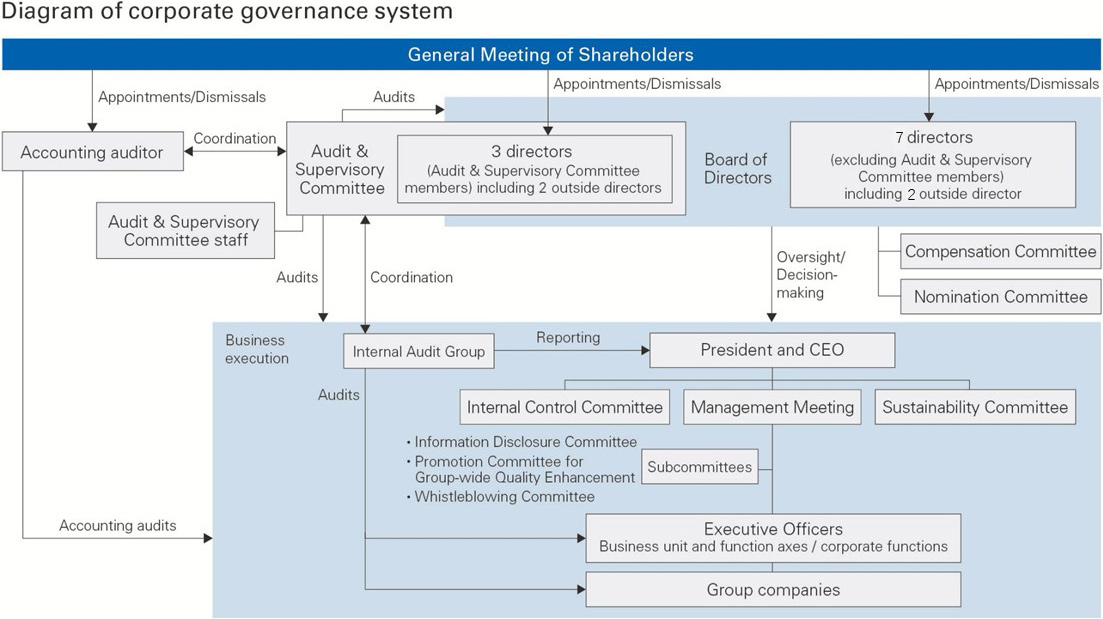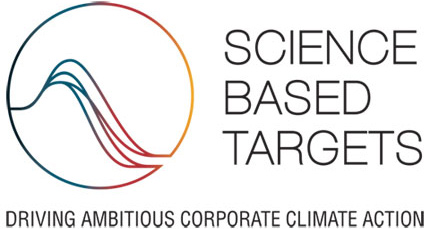Information Disclosure Based on TCFD Recommendations
In April 2021, Casio announced its support for the recommendations of the Task Force on Climate-related Financial Disclosures (TCFD) and disclosed information based on the recommendations as follows. Based on this, Casio is working to strengthen its governance relating to climate change, formulate strategies based on climate-change risk and opportunity analysis, and disclose climate-related financial risk information.

Governance
Casio has included climate change issues within its governance and management systems addressing sustainability.
Casio now has a system in place for appropriate oversight of management decision-making and monitoring of progress related to important sustainability issues, including climate change. The Sustainability Committee works closely with the Management Meeting, and its membership mainly consists of the CEO, CHRO, CFO and the heads of each business and each functional headquarters, who manage business operations. The committee fully discusses important sustainability issues and reports the results to the Board of Directors.
* Please refer below diagram of corporate governance system.
Corporate Governance System

Strategy
In line with the TCFD recommendations, Casio has assessed the risks and opportunities posed by the impact of climate change that the Group faces in terms of their level of importance based on the likelihood of occurrence and the impact on business.
Casio will conduct regular analysis of the identified risks in light of future changes in the environment.
Results of Assessment based on Scenario Analysis
| Category | Assumed scenario | Assessment items | Priority measures | Timeframe | Financial impact | ||
|---|---|---|---|---|---|---|---|
| 1.5°C scenario (transition risks) | ■ Strict regulations to address climate change will be enforced around the world, and increases in temperature will be kept within a certain range. ■ There will be no major increase in natural disasters. ■ Population and income growth will continue, primarily in emerging countries. ■ Carbon tax and other burdens will increase, and energy and material prices will rise sharply. |
Initiatives to address key issues set out in the Casio Group Basic Policies on the Environment | Realizing a decarbonized society | ・Active introduction of renewable energy ・Systematic introduction of high-efficiency facilities ・Promotion of supply chain optimization ・Conservation of forest resources |
Short- to long-term | Medium | |
| Building a recycling society | ・Promotion of circular economy ・Shift to environmentally-friendly materials |
Short- to long-term | Medium | ||||
| 3°C scenario (physical risks) | ■ GHG emissions cannot be reduced sufficiently, and temperatures will continue to increase. ■ Natural disasters will increase and expand in terms of both frequency and scale. ■ Population growth will continue, primarily in emerging countries, but the income gap with developed countries will expand. ■ The effect of carbon tax and similar measures will be limited. |
Damage to business sites due to natural disasters | ・Promotion of supplier disaster assessments ・Enhancement of supply chain BCM effectiveness |
Short- to medium-term | Small | ||
| Damage to business sites due to rising sea levels | ・Reconstruction of global production and procurement systems | Medium- to long-term | Large | ||||
Opportunities |
Common to 1.5℃/3℃ scenarios | Provision of opportunities to develop environmental technologies | ・Expansion in products with longer service life, low power consumption, and multiple functions and development of system for reusing and recycling products ・Provision of service value utilizing the internet ・Provision of support for customer reductions in energy consumption ・Expansion of customer contact by strengthening e-commerce ・Provision of educational opportunities to emerging countries |
Short- to long-term | Large | ||
Timeframes — Short term: up to 2024 Medium-term: up to 2030 Long-term: up to 2050
Risk Management
At Casio, the Sustainability Committee manages climate change-related risk appropriately.
Casio has a system in place in which the relevant organizations deal appropriately with other risks, including natural disaster risk, in collaboration with each other under the supervision of the Internal Control Committee while working closely with the Management Meeting.
* Please refer above diagram of corporate governance system.
Indicators and targets
Casio positions realizing a decarbonized society as a key issue in the Casio Group Basic Policies on the Environment, has established the following targets for reducing GHG emissions, and has had its targets validated by the Science Based Targets initiative.
Casio aims to reduce its Scope 1 and 2 emissions by 38%* compared to fiscal 2019 levels before the end of 2031 and is aiming for net zero emissions by 2051.
(1) For Categories 1 and 11 of Scope 3 emissions, the aim is for a 30% reduction compared to fiscal 2019, by 2031.*
(2) To achieve these goals, Casio has joined RE100 and is actively adopting renewable energy, while working with its business partners to reduce greenhouse gas emissions in the supply chain.
* SBT-validated targets

